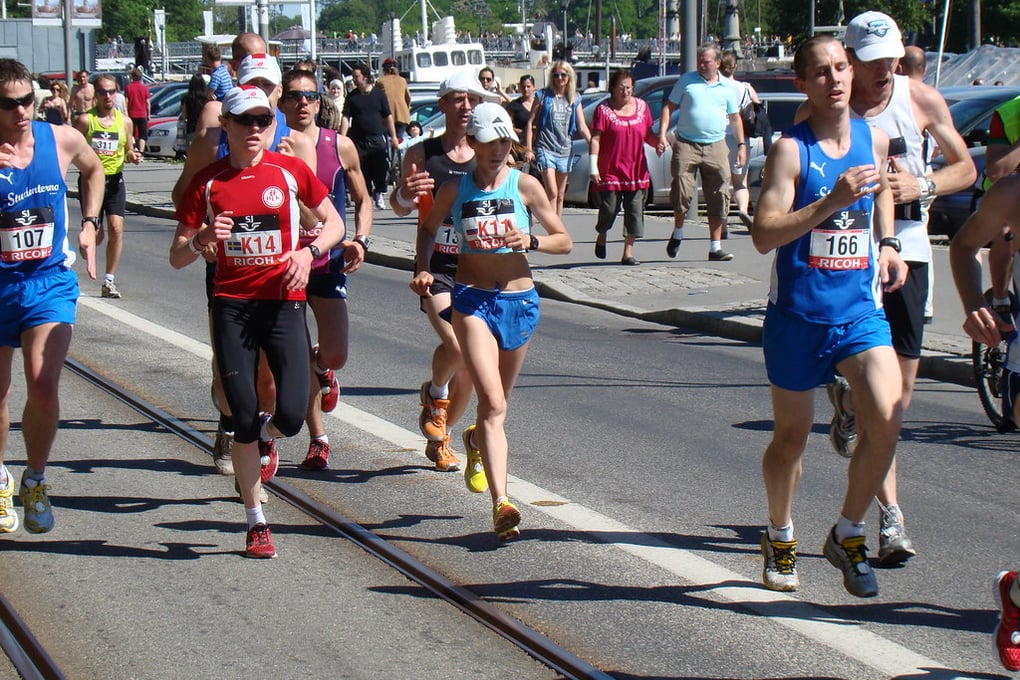If you’re reading this article, you are probably interested in running a marathon, or are currently training for one. (If you’re an overachiever, you might have already run one.) I recently decided to run a marathon, after my friend and I realized that if we were ever going to run a marathon, it would be easiest to get done in college and while we each had someone to train with. We found a race shortly after, and are now training for the Orange County Marathon.
Now that I’ve been training for about two months and the marathon is coming up in May, I’ve compiled some essential tips and tricks for first time marathoners. I’ll be focusing on tips that aren’t related to food and nutrition, because everyone and every body is different! Nutrition is obviously a major part of training, and I have maintained my vegan diet throughout this process by increasing my protein to help reduce recovery time and prevent muscle catabolism.
That being said, let’s get into the 8 tips that will help you successfully run your first marathon.
1. Write It All Out
The very first thing my friend and I did when we decided to run this marathon was research different training schedules and then write it all out. We used large wall calendars, but a fitness planner like the one pictured works great as well. We wrote our workouts for every day of the week, including any rest days (usually one a week).
We make sure to complete each workout on the schedule, but sometimes move them around depending on our work and class schedules. It can be tricky to fit it all in when you have early morning classes or work, but you can make it work! Even if it means a 6 a.m. cross-training session or running your nine mile long run inside on the treadmill because it’s pouring rain outside (don’t recommend this), you can make it work.
2. Get Techy
The two most important gadgets to have for marathon training are a pair of wireless headphones that stay in your ears and some type of running watch. I’ve tested a few pairs of headphones throughout my training, and I’ve decided that I like wireless headphones much better than the traditional, wire kind. I’ll admit, it can be tricky to find a pair that stays inside your ears while on a long, sweaty run, but my favorite right now are the Bose wireless sport headphones and the SENSO Bluetooth Headphones from Amazon (less than $30!).
As for a watch, I would personally recommend Garmin over any other brand. I have gone through several Garmin watches through the years and their quality can’t be beat. I currently use the Vivoactive 3 Music and absolutely love it. A Garmin Forerunner is also a great choice for a running watch. Just make sure your watch can track your mileage, pace, elevation and heart rate and you should be all set!
3. Be On Top of Your Shoe Game
Oh, shoes. Running shoes definitely come down to personal preference. Some runners swear by Brooks, Nike or Saucony, but my personal favorite running shoes are Asics. I’ve been running in Asics for about nine years and have never looked back.
To prevent injuries and make sure your shoes are right for you, try having a gait analysis done at your local sporting goods store— the last thing you want when logging all those miles is discomfort during your runs! It’s also super important to only use your running shoes for running (invest in separate cross-training and strength shoes) and alternate your running shoes if possible during training.
#SpoonTip: About a month before your marathon, make sure to switch out your shoes for a new pair and break them in before race day.
4. Invest In Recovery Supplements
Supplements have definitely been new to me throughout this experience. I never really thought I would purchase BCAA’s (branched chain amino acids) to supplement my workouts, but I am so, so glad I did. Initially, I really thought all the hype about BCAA’s was just due to a placebo effect. I can definitely say that BCAA’s have improved my recovery time, reduced soreness and increased my endurance on runs and in the gym. I swear by these BCAA’s from Raw Barrel, which are plant-based, reasonably priced and don’t require mixing with water.
I’d also like to mention electrolytes— how can you be a runner without Nuun? Nuun makes amazing electrolyte enhanced drink tabs, which you plop into your water bottle and let fizz away. They have a great variety of flavors, including some fortified with vitamins or caffeine. I personally loved the caffeinated tabs for pre-, intra- or post-run hydration.
5. Catch Those Z’s
I know, I know. College doesn’t exactly allow for a perfect eight hours of sleep every single night. But we can at least try, right? It’s amazing what sleep does for your body, and since I prefer to work out in the mornings, a good night’s sleep always helps my endurance during runs, cross-training or strength training. If possible, try and get to bed before midnight, because the hours of sleep you get before the clock strikes 12 are actually the most valuable. Plus, who doesn’t love a good long sleep after a day of running, class and everything else that goes on during the day?
6. Try to be a Yogi (or at least stretch)
This is probably the tip I am most passionate about. Now, I might be a little biased because I have been practicing yoga for a few years, but 10 minutes of stretching after your workouts is a totally viable option too. Simple stretches like runner’s lunge, downward dog, spinal twists and calf stretches are perfect pre- or post-run. If you hate stretching, you should probably start liking it if you’re going to train for a marathon. Believe it or not, a little flexibility is necessary for running, and it makes your workouts so much better too. I use my stretching time as an opportunity to call my Mom, listen to music, drink a smoothie or catch up on Youtube, so you could say its productive too!
Plus, going to a yoga class once in a while with a friend is super relaxing and great for your overall mental health as well. See ya later, stress!
7. Find a Buddy
I can’t stress this tip enough! Finding a person that was willing to endure all the tough training that comes along with a marathon was key for me. Knowing I have a friend to train with in the morning is a huge motivator for me, and we both agree that running with someone else makes long runs a *little* less painful. Having a running buddy also makes the post-long run waffle meal 20 times better, just sayin’.
8. Compression is Key
This last tip is honestly a game changer. If you are new to long-distance running or are a first time marathoner, you may not be aware that compression gear is basically the best thing ever. CEP makes the best compression calf sleeves I’ve ever tried, and I swear by them on runs over nine miles. Especially if you suffer from calf or shin pain, compression calf sleeves might be a way to help prevent injuries from occurring during high volume training. As my mileage increases, I will definitely be using these a lot more to increase blood flow, improve recovery, and reduce soreness. And yes, I am definitely wearing my neon pink calf sleeves for my marathon.
Reminder: You Got This
If you were nervous about marathon training as a college student, hopefully this list helps ease your nerves a bit. So what are you waiting for? Get training!


